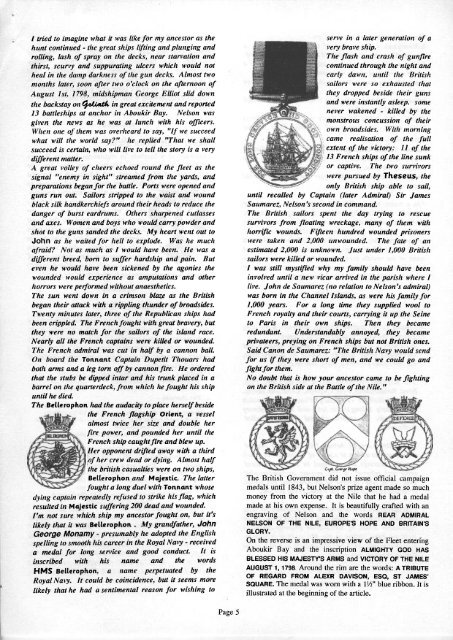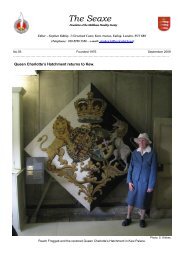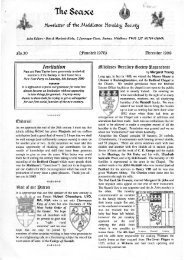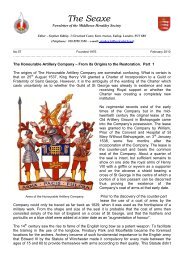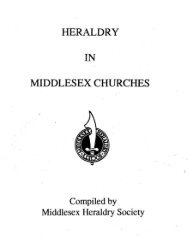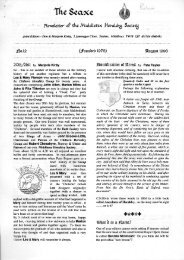The Seaxe - Middlesex Heraldry Society
The Seaxe - Middlesex Heraldry Society
The Seaxe - Middlesex Heraldry Society
You also want an ePaper? Increase the reach of your titles
YUMPU automatically turns print PDFs into web optimized ePapers that Google loves.
1 tried to imagine what it was like for my ancestor as the<br />
hunt continued - the great ships lifting and plunging and<br />
rolling, lash of spray on the decks, near starvation and<br />
thirst, scurvy and suppurating ulcers which would not<br />
heal in the damp darkness of the gun decks. Almost two<br />
months later, soon after two o'clock on the afternoon of<br />
August 1st, 1798, midshipman George Elliot slid down<br />
the backstay on Goliath in great excitement and reported<br />
13 battleships at anchor in Aboukir Bay. Nelson was<br />
given the news as he was at lunch with his officers.<br />
When one of them was overheard to say, "If we succeed<br />
what will the world say?" he replied "That we shall<br />
succeed is certain, who will live to tell the story is a very<br />
different matter.<br />
A great volley of cheers echoed round the fleet as the<br />
signal "enemy in sight" streamed from the yards, and<br />
preparations began for the battle. Ports were opened and<br />
guns run out. Sailors stripped to the waist and wound<br />
black silk handkerchiefs around their heads to reduce the<br />
danger of burst eardrums. Others sharpened cutlasses<br />
and axes. Women and boys who would carry powder and<br />
shot to the guns sanded the decks. My heart went out to<br />
John as he waited for hell to explode. Was he much<br />
afraid? Not as much as I would have been. He was a<br />
different breed, born to suffer hardship and pain. But<br />
even he would have been sickened by the agonies the<br />
wounded would experience as amputations and other<br />
horrors were performed without anaesthetics.<br />
<strong>The</strong> sun went down in a crimson blaze as the British<br />
began their attack with a rippling thunder of broadsides.<br />
Twenty minutes later, three of the Republican ships had<br />
been crippled. <strong>The</strong> French fought with great bravery, but<br />
they were no match for the sailors of the island race.<br />
Nearly all the French captains were killed or wounded.<br />
<strong>The</strong> French admiral was cut in half by a cannon ball.<br />
On board the Tonnant Captain Dupetit Thouars had<br />
both arms and a leg torn off by cannon fire. He ordered<br />
that the stubs be dipped in tar and his trunk placed in a<br />
barrel on the quarterdeck, from which he fought his ship<br />
until he died.<br />
<strong>The</strong> Bellerophon had the audacity to place herself beside<br />
the French flagship Orient, a vessel<br />
almost twice her size and double her<br />
fire power, and pounded her until the<br />
French ship caught fire and blew up.<br />
Her opponent drifted away with a third<br />
of her crew dead or dying. Almost half<br />
the British casualties were on two ships,<br />
Bellerophon and Majestic. <strong>The</strong> latter<br />
fought a long duel with Tonnant whose<br />
dying captain repeatedly refused to strike his flag, which<br />
resulted in Majestic suffering 200 dead and wounded.<br />
I'm not sure which ship my ancestor fought on, but it's<br />
likely that it was Bellerophon. My grandfather, John<br />
George Monamy - presumably he adopted the English<br />
spelling to smooth his career in the Royal Navy - received<br />
a medal for long service and good conduct. It is<br />
inscribed with his name and the words<br />
HMS Bellerophon, a name perpetuated by the<br />
Royal Navy. It could be coincidence, but it seems more<br />
likely that he had a sentimental reason for wishing to<br />
Page 5<br />
serve in a later generation of a<br />
very brave ship.<br />
<strong>The</strong> flash and crash of gunfire<br />
continued through the night and<br />
early dawn, until the British<br />
sailors were so exhausted that<br />
they dropped beside their guns<br />
and were instantly asleep, some<br />
never wakened - killed by the<br />
monstrous concussion of their<br />
own broadsides. With morning<br />
came realisation of the full<br />
extent of the victory: 11 of the<br />
13 French ships of the line sunk<br />
or captive. <strong>The</strong> two survivors<br />
were pursued by <strong>The</strong>seus, the<br />
only British ship able to sail,<br />
until recalled by Captain (later Admiral) Sir James<br />
Saumarez, Nelson's second in command.<br />
<strong>The</strong> British sailors spent the day trying to rescue<br />
survivors from floating wreckage, many of them with<br />
horrific wounds. Fifteen hundred wounded prisoners<br />
were taken and 2,000 unwounded. <strong>The</strong> fate of an<br />
estimated 2,000 is unknown. Just under 1,000 British<br />
sailors were killed or wounded.<br />
I was still mystified why my family should have been<br />
involved until a new vicar arrived in the parish where I<br />
live. John de Saumarez (no relation to Nelson's admiral)<br />
was born in the Channel Islands, as were his family for<br />
1,000 years. For a long time they supplied wool to<br />
French royalty and their courts, carrying it up the Seine<br />
to Paris in their own ships. <strong>The</strong>n they became<br />
redundant. Understandably annoyed, they became<br />
privateers, preying on French ships but not British ones.<br />
Said Canon de Saumarez: "<strong>The</strong> British Navy would send<br />
for us if they were short of men, and we could go and<br />
fight for them.<br />
No doubt that is how your ancestor came to be fighting<br />
on the British side at the Battle of the Nile."<br />
<strong>The</strong> British Government did not issue official campaign<br />
medals until 1843, but Nelson's prize agent made so much<br />
money from the victory at the Nile that he had a medal<br />
made at his own expense. It is beautifully crafted with an<br />
engraving of Nelson and the words REAR ADMIRAL<br />
NELSON OF THE NILE, EUROPE'S HOPE AND BRITAIN'S<br />
GLORY.<br />
On the reverse is an impressive view of the Fleet entering<br />
Aboukir Bay and the inscription ALMIGHTY GOD HAS<br />
BLESSED HIS MAJESTY'S ARMS and VICTORY OF THE NILE<br />
AUGUST 1,1798. Around the rim are the words: A TRIBUTE<br />
OF REGARD FROM ALEXR DAVISON, ESQ, ST JAMES'<br />
SQUARE. <strong>The</strong> medal was worn with a 1½" blue ribbon. It is<br />
illustrated at the beginning of the article.


